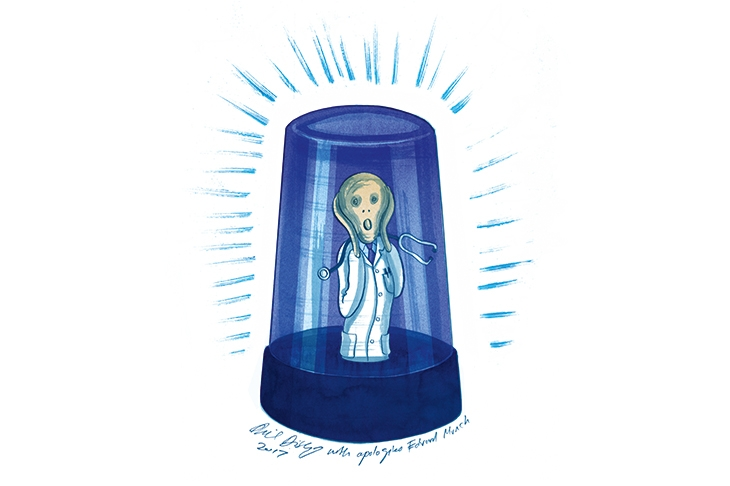If the Donald Trump-JD Vance ticket is successful in November and the pair head to the White House, there is a former US president who would surely turn in his grave: Ronald Reagan. While Reagan saw the importance of American involvement in Europe, Trump and his running mate Vance seem in favour of adopting a more hands-off attitude. It’s an approach that could unpick Reagan’s hard-fought legacy in eastern Europe.
What a different world it was back in the Eighties when Reagan was US president and the epitome of Western power and influence. In June 1987, he stood before the Brandenburg Gate in West Berlin and gave a historic speech, one line of which was to become famous: ‘Mr Gorbachev, tear down this wall!’ His advisors had counselled him to remove the passage, considering it too ‘extreme’. But Reagan said, ‘I think we’ll keep it in.’
While the East German government condemned Reagan’s speech as ‘an absurd demonstration by a cold warrior’, West German chancellor Helmut Kohl said it was ‘a stroke of luck for the world, especially for Europe’. And so it was. President Gorbachev took note, East-West tensions began to relax and a path was set to the end of the Cold War. Two short years later, the Berlin Wall came tumbling down. Before long, the Iron Curtain itself, which had divided Europe in half after the Second World War, followed suit. To the newly liberated populations of Eastern Europe, Ronald Reagan was a hero.
So what would he make of his successor, Donald Trump, 45th president of the United States, and quite possibly its 47th as well? For this is the man who, along with his vice presidential candidate, J.D. Vance, is in danger of undoing some of what Reagan helped to achieve three and a half decades ago.
Trump and Vance have made it perfectly clear that they don’t believe in unequivocally supporting Ukraine in its existential war against Russia. Without billions in US military aid, Ukraine will quickly buckle under and be forced to accept a Putin victory – thus confirming that the brutal autocrat who laments the dissolution of the Soviet Union can get away with his war of conquest and expansion. A new dividing line will be secured: anxious Nato countries to the west of it, and Russia, Belarus and a subjugated Ukraine to the east.
When Russia first invaded Ukraine in February 2022, Trump described the move as ‘genius’ and ‘savvy’. As president he’d had a kind of bizarre ‘bromance’ with Vladimir Putin. ‘I got along with him great,’ Trump boasted. ‘He liked me. I liked him. I mean, you know, he’s a tough cookie, got a lot of great charm and a lot of pride.’ According to his one-time advisor Fiona Hill, Trump admired Putin’s strong-arm leadership and longevity in power. He also ‘thought Ukraine, and certainly Crimea, must be part of Russia. He really could not get his head around the idea that Ukraine was an independent state.’
Trump has recently asserted that the US can’t afford to keep subsidising Ukraine’s war and that if he regains the presidency, the flow of money will dry up. He’s not wholly unsympathetic to Ukraine’s plight, but won’t be drawn about which side he wants to win: ‘I don’t think in terms of winning or losing. I think in terms of getting it settled so we stop killing all these people.’ He wants only to ‘bring peace to the world and end the war that has cost so many lives.’ His plan is to meet with Putin and Ukrainian president Volodymyr Zelensky and ‘end the war in 24 hours’, presumably by knocking their heads together. But as is clear by now, the only way Russia will agree to stop its war is if it can keep the roughly 20 per cent of Ukraine it has occupied.
Then there’s Vance, poster boy for America First ideology, who remarked publicly: ‘I gotta be honest with you, I don’t really care what happens to Ukraine one way or another.’ He’s said that he admires the ‘brave Ukrainians’ fighting on on the ground, but also that it would be ‘in America’s best interest’ if Ukraine ceded territory to Russia. How exactly? And it certainly wouldn’t be in the interest of Europe to embolden Putin to commit further neo-imperialist aggressions, including against Nato countries.
If president Reagan represented American power in the most positive sense (his administration didn’t, of course, get everything right), then Trump-Vance represents an abrogation of that power, a retreat into old-fashioned, go-fend-for-yourselves isolationism. As someone whose family escaped from the communist horrors on the other side of the Iron Curtain, it feels as if this new-style Republican party wants to flip history on its head. This isn’t how the 21st century is meant to play out. Stalin’s USSR created a half-century of ruthless dictatorship in its satellite states, and with its defeat we entered a new era of freedom.
Now Putin wants to turn the clock back. But for me, and untold millions who remember the bad old days of Russian tyranny, the real superstar was Ronald Reagan. I was on a visit to Budapest in 1980 when he was running for president. The young people at a social gathering I attended (either actual communists or pretending to be) made fun of the ‘Hollywood cowboy’ on the Republican ticket. An actor, and not even a good one: ha, what a joke!
But by the end of the decade they weren’t laughing anymore. Ronald Reagan had emerged as a world leader who’d helped effect momentous change. Young and old celebrated their new independence and suddenly you couldn’t find a communist in Hungary for love or money.







Comments